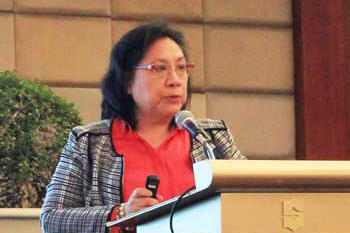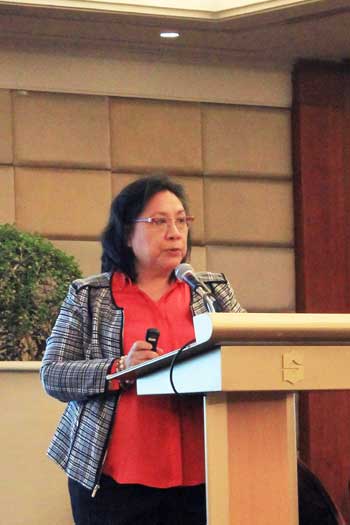DoLE sheds more light to 3 laws favorable to contact center agents

Date:
May 27, 2019
HOW are safety standards observed in the workplace of contact center agents during times of calamities? Is there an alternative working arrangement so employees can spend more quality time with family? What are the latest regulations for working mothers who inevitably need to take a leave of absence from work due to childbirth?
These are some of the most pressing questions from most of the contact center professionals nationwide. To shed some light and understand amendments to existing laws, the Contact Center Association of the Philippines (CCAP) has invited the Department of Labor and Employment (DoLE) to the organization’s first General Membership Meeting for 2019.
DoLE Director Teresita Cucueco addressing the members
of Contact Center Association of the Philippines.
DoLE Director Teresita Cucueco was tapped as a resource person during the gathering, which was held on April 30 at the Makati AB Function Room of the Shangri-La Manila Hotel in Makati City. Cucueco focused on these three laws and explained why and how each legislation could be advantageous to every contact center agent and employee across the country.
The Republic Act No. 11058 or the Occupational Safety and Health Law upholds the overall safety of all employees in their workplaces at all times. “We are pleased to have this assurance that during times of catastrophe, employees’ safety and health would come as a top priority in the workplace,” said Cucueco.
The Republic Act No. 11165 or the Telecommuting Act provides a viable option for any contact center agent to render work hours outside the company’s designated workplace. The employee can work at home or at a co-working space—where he/she can still perform the activities without any disruption and where there is available equipment and technology to facilitate business processes.
CCAP President Jojo Uligan said telecommuting is not a new option for the industry. “Telecommuting was not successful when I piloted such a program in 2003,” he recalled. “There was still no sufficient technology back then and security was another issue in terms of data privacy. However, these days, we know that these setbacks can effectively be addressed.”
Finally, working mothers welcome the implementation of the Republic Act No. 11210 or the Expanded Maternity Leave Law. Under this new legislation, a working mother can file a paid leave of up to 105 days along with an added option to extend that leave—though without pay—for another 30 days.
Source: The Manila Times















